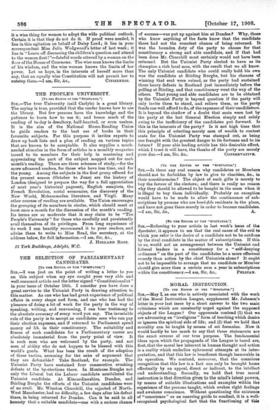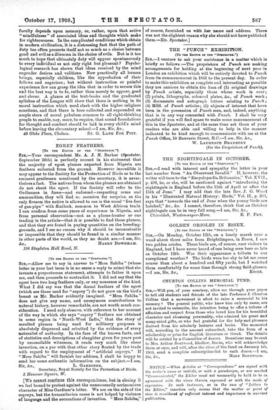MORAL INSTRUCTION.
[To TER EDITOR OP THE .`SPRCTATOR.1 Sin,—May I., as one who is actively associated with the work of the Moral Instruction League, supplement Mr. Johnson's letter in your last issue by a short answer to the twa main criticisms which are constantly urged against the supposed objects of the League ? Our opponents contend (1) that we are advocating an "irreligious" form of teaching which denies or ignores the spiritual side of life; and (2) that we hold that morality can be taught by means of set formulae. Now it would hardly be too much to say that these statements are the exact reverse of our true purpose. The fundamental ideas upon which the propaganda of the League is based are, first, that the moral law inherent in human thought and action is a reality which underlies ephemeral attempts at its inter- pretation, and that this law is beneficent though inexorable in its operation. We contend, moreover, that the conscious recognition that this law is a fact can only be brought home effectually by an appeal, direct or indirect, to the intellect and understanding. Secondly, we hold that true moral instruction is that direction given to the mind's latent powers, by means of suitable illustrations and examples within the experience of the persons taught, which evokes right feelings and awakens conscience. Without questioning the existence of "conscience" as an unerring guide to conduct, it is a well- recognised psychological fact that the functioning of this faculty depends upon memory, or, rather, upon that active "mindfulness" of associated ideas and thoughts which male for righteousness. In the complicated conditions which obtain in modern civilisation, it is a distressing fact that the path‘of duty too often presents itself not so much as a choice between good and evil as a dilemma in the choice of evils. But is it too much to hope that ultimately duty will appear spontaneously to every individual as not only right but pleasant P Psycho- logical research has shown that ideas received by the mind engender desires and volition& Now practically all human beings, especially children, like the approbation of their fellows and superiors ; but without instruction or painful experience few can grasp the idea that in order to secure this end the best way is to be, rather than merely to appear, good and clever. A glance at the text-books and the graduated sylla:bns of the League will show that there is nothing in its moral instruction which need clash with the higher religious sanctions, and that there is here collected and expounded an ample store of moral pabulum common to all right-thinking people to enable, nay, more, to require, that sound foundations for thought and conduct should be laid in every child's mind before leaving the elementary school.—I am, Sir, &c.,















































 Previous page
Previous page